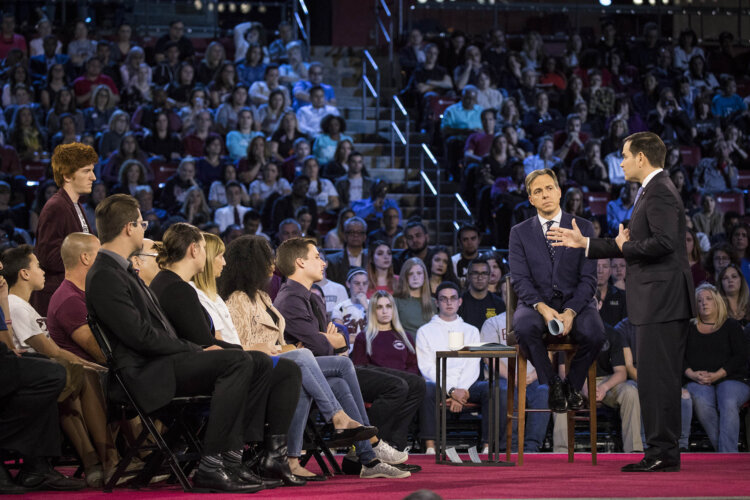
The nation is reeling from the most recent school shooting – a slaughter of 17 students and teachers at Marjory Stoneman Douglas High School in Parkland, Florida. Teenagers have lost their childhoods in a single day, lost friends in a single minute, lost their innocence forever, in the regular pattern of shock and horror that follows news of a shooting. But instead of – or in addition to – mourning, they are gathering, mobilizing, acting. We even know some of their names, these teenagers who – a week ago – were blissfully anonymous: now their faces are on CNN, their verified Tweets in our feeds, calling for action, legislation, public gathering. In a week, their actions have arguably been more effective than previous efforts to advance the national conversation on gun violence, through Facebook conversations and protest events, as well as through Twitter hashtags, yesterday’s meeting at the White House with the President, and last night’s CNN Town Hall, “Students of Stoneman Douglas Demand Action.” (If you missed it, stay tuned – we’ve embedded some of the clips here for your viewing convenience.)
During the Town Hall, as the faces of the fallen students and teachers floated by on a screen – in memoriam – I wept. As the teens (and some of their parents and teachers) stood up and spoke directly to lawmakers – demanding that they keep NRA money out of their electoral campaigns, that gun control (banning assault weapons and bumpstocks that turn semi-automatic weapons into automatic weapons and increased vigilance with background checks) needs to happen now, I cheer-cried. They stood in solid opposition to the the seasoned politicians, face-to-face, victims standing as a united, determined front, speaking truth to power, for their own futures and in the names of their slain friends whose voices were silenced.
The politicians in the center of the town hall were Sens. Marco Rubio and Bill Nelson and Rep. Ted Deutch in one segment, followed by another segment with Broward County Sheriff Scott Israel and National Rifle Association spokeswoman Dana Loesch. More than a few times, students and moderator Jake Tapper mentioned the absence of the President and Florida governor Rick Scott.
Ryan Schacter, a senior at MSDHS whose brother, Alex, was killed in the shooting, addressed Deutch: “My friends and I are worried that we are going to be murdered in our classrooms. What reassurances can you give me and what specifically are you going to do to make sure that we can’t have this fear?” Deutch responded that “as a starter, next week when we go back to Washington, we’re going to introduce legislation to make sure that assault weapons are illegal in every part of this country…the best way for us to show that is to take action in Washington, in Tallahassee, to get these weapons of war off of our streets.”
Fred Guttenberg, whose 14-year-old daughter Jaime was killed in the shooting, was brutally honest with Rubio. “Look at me and tell me guns were the factor in the hunting of our kids in this school this week,” he said. “And, look at me and tell me you accept it, and you will work with us to do something about guns.”
Cameron Kasky, one of the most vocal students in the aftermath of the shooting, put Rubio on the spot about his NRA funding: “Senator Rubio, can you tell me right now that you will not accept a single donation from the NRA in the future?”
Rubio said that he was willing to answer questions about “any policy issue” but that “our goal here is to move forward…and prevent — and prevent this from ever happening again.”
“… in the name — in the name of 17 people, you cannot ask the NRA to keep their money out of your campaign?” Kasky countered.
“I think in the name of 17 people, I can pledge to you that I will support any law that will prevent a killer like this from getting a gun,” Rubio said. (Kasky didn’t let him off the hook: view the segment below or read the official transcript.)
Addressing Sen. Rubio, student Chris Grady said that he believes “a big issue, when it comes to the debate about semiautomatic weapons and automatic weapons is large capacity magazines. Would you agree that there is no place in our society for large capacity magazines capable of firing off — over — from 15 to 30 rounds and if not more?
Rubio said that he previously had “not supported looking at magazine clip size, and after this and some of the details I learned about it, I’m reconsidering that position,” adding that “because while it may not prevent an attack, it may save lives in an attack.”
There’s a flicker of optimism now. These students are tenacious, emotionally motivated and organizationally capable. They are ascendant voters and, likely, lifelong activists devoted to political change, education and public safety. Some may be the senators and representatives of the future, who will rise to replace the current politicians who stand intransigent or paralyzed in the gun debate. They may make the kind of impact that previous activists have been unable to. I am so impressed with these students. They hold elected officials responsible for their voting records and the financial interests that fund their campaigns and influence their legislation. They exude a fierceness forged in their own terror, anger and grief. And I am so heartbroken that they have to. This should not be their job. This should not be their life.
One of the slogans for the emerging student activist movement is “Never Again.” And it’s undeniable that this kind of attack, against children, should never happen again.
But in naming this movement, the students have unwittingly bumped up against another activist movement. Some believe – and have been discussing this in various social media spaces – that that slogan – “never again” – should be invoked only when speaking about the horrors of the Holocaust.
We could speak theoretically about the ownership of language, about who determines the “real meaning” of two English words that are often, but not exclusively, put together in a certain context? Is it “whoever gets there first”? Or, in the case of no registered trademark or proper name, can phrases be used in different contexts? Is an association by one group enough to preclude the rest of the English-speaking world from never again saying “never again” except in applying to the Holocaust? The students did not choose this term to co-opt it from or to compare their loss to the horror of the Holocaust.
The students are leading – as victims who feel democracy’s empowerment and teenagers’ energy – in a way that “adults” have not been able to thus far. They have proclaimed it the “Never Again MSD” movement. I believe that it is not up to us to tell them, “sorry, those two words, so juxtaposed, are already taken by a different tragedy, choose something else.” And I think we can believe more than one thing at once – that never again should a Holocaust occur, and that never again should a student be gunned down in school.
In a world of things where there is so much brokenness, heartbreak, tragedy and horror, there is a lot to rise up against and act in memory of. Our words – like our hearts and convictions and activism – must be big enough to contain these issues as we take action to repair the world, whether our primary motivation is because of the memory of 17 or because of the memory of six million.
[Photos and videos courtesy of CNN]


Grok Nation Comment Policy
We welcome thoughtful, grokky comments—keep your negativity and spam to yourself. Please read our Comment Policy before commenting.